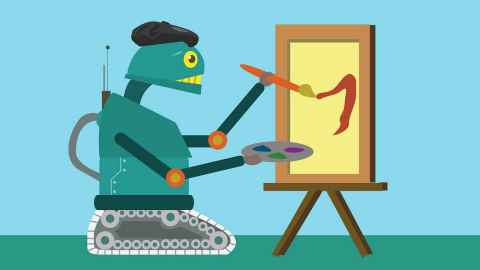Artificial intelligence is here with a vengeance, and skills such as creativity and critical thinking will become even more valuable, say Alex Sims and Dulani Jayasuriya.

Opinion: We were warned about artificial intelligence. We were warned about it disrupting many industries. In particular, professionals such as architects, doctors, accountants, lawyers, and consultants would be affected. However, we were told the changes would be gradual, and they were, until late 2022 when ChatGPT3.5 burst onto the scene.
ChatGPT and the other artificial intelligence (AI) generative tools are a paradigm shift and, for some, an existential crisis.
The AI generative tools have seemingly come out of the blue. Even those people who worked on older versions of ChatGPT have been astonished at its versatility, range, and usefulness - and its ability to do things its creators did not expect.
AI tools are improving in leaps and bounds. Microsoft Bing, PaLM, LaMDA, Github, Copilot, and ChatGPT4 make earlier versions of such tools appear quaint and rudimentary. These models are not explicitly given the correct output for a particular input. Instead, they must acquire the capability to generate results based on data alone.
So, what of the future of work?
Some people believed AI would first disrupt our more routine or menial occupations but, as we are witnessing, what humans find difficult, is often easy for AI, such as solving complicated mathematical formulas or synthesising and analysing vast amounts of information before presenting the results in perfectly written English. Meanwhile, AI struggles with tasks easy for humans, such as making beds … although it is gaining in those areas too.

Tasks we thought up to a year ago AI could not do, it's now doing. One article, less than a year old, claimed that writing software could only be done by humans because AI doesn't understand the real world and lacks the ability to transform the world's intricacies into rules. AI, it turns out, can write code, and well.
The need for a reconsideration of skills and knowledge is not new. Pre-Covid, in a talk to a room of academics teaching finance, one of us explained that, with technological advances, much of what was being taught was quickly becoming obsolete. As the speaker noted, to the discomfort of the audience, what had once required 400 people at trading desks now needed two people, plus a tech support person to keep the computers running.
As with all technology, there are losers and winners.
In the 1990s, the advent of Photoshop put some skilled retouching specialists, who had manually manipulated photographs for years, out of work because they weren't interested in, or were unable to transition to, using the new tool. Overall, the industry required fewer specialists as Photoshop provided faster, more powerful, and cheaper tools.
However, technology has not always put people out of work.
Many claimed computerised spreadsheets would see the demise of accountants. On the contrary, the number of accountants did not fall. Computerised spreadsheets actually liberated accountants. Calculating numbers was no longer needed and they were able to focus on other aspects of their roles as well as more creative endeavours.
Yet, it is not as simple as AI replacing the core of a professional's role, as computerised spreadsheets did for accountants. While AI can give uncannily accurate answers in many situations, the data AI tools draw upon can be incorrect for various reasons and can be biased. As a result, human experts will still be needed, although not as many.
One crucial skill will be the ability to use the new AI tools without producing work that appears AI-generated. The world will increasingly be awash with generic and banal AI-generated work.
Clarkesworld Magazine, a science fiction and fantasy publication, stopped accepting submissions in February following a flood of AI-generated stories. After sharing one of his works on r/Art, a subreddit with 22 million members, artist Ben Moran found himself at the centre of an online controversy. Subreddit moderators had banned him on suspicion of using AI-generated art, which is against r/Art's rules. However, the digital artist proved his art was not AI-generated. In fact, he had spent more than 100 hours working on the piece.
It's clear that AI is changing the future of work - how work is created, viewed, and received, and the value that is placed on it.
And, as we work our way through this fundamental shift, skills such as creativity and critical thinking will be even more valuable. Meanwhile, the ability to use AI tools adeptly will need to be harnessed as we transition into new ways of working.
Dr Alex Sims is an associate professor in the Department of Commercial Law at the University of Auckland Business School.
Dr Dulani Jayasuriya is lecturer in the Department of Accounting and Finance, University of Auckland Business School.
This opinion piece was first published on the National Business Review.






